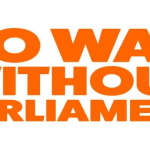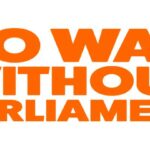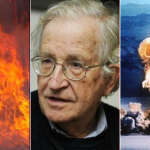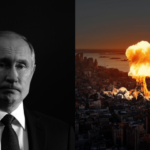Dr Alison Broinowski on the War Powers Inquiry Succeeding Despite Marles’ Intervention

For people born over recent decades, global wars and the use of nuclear weapons are aspects of a fading black and white past, despite their having become very real prospects for the near future.
Right now, world leaders have been threatening to toss around a few nuclear warheads, while divided lines are increasingly being defined in relation to the war in Ukraine and the coming war on China.
If someone pushes the nuclear button, it’s basically sayonara for us all.
But the decision on whether Australia enters into the Ukrainian war or the more likely determination that our nation enters into a conflict against Beijing has nothing to do with we the people.
Indeed, that choice is solely prime minister Anthony Albanese’s to be made, along with some accompanying advice from a select group of ministers.
This protocol is based on a centuries-old practice we inherited from Britain, which reflects a time when the monarch made the call to go to war.
But in acknowledgment that this is an antiquated convention that should be reformed, and the decision be opened up to parliament, which would engage public opinion, Albanese promised that if elected his party would hold an inquiry into making the rational change.
Cutting its wings
The government announced on 30 September 2022 that the much-anticipated war powers inquiry has been established. It will deliberate upon whether the determination that our nation enters a foreign theatre of war be a whole-of-parliament decision.
Instead, war powers, or the decision whether to go to war, now rests with the National Security Committee, which currently consists of Albanese, Richard Marles, Penny Wong, Jim Chalmers, Chris Bowen, Mark Dreyfus, Clare O’Neil, Katy Gallagher and Pat Conroy.
Albanese was responsible for appointing all the other ministers on the committee to their portfolios, so this is why war powers are said to ultimately be a prime ministerial determination.
But handing it over to parliament to debate and decide upon, means constituencies can put pressure on their local members to vote in a certain way.
And in the case of China, where both majors are trigger happy, war powers being held by parliament would mean those against the war, such as the Greens and teal independents, would get the chance to influence the outcome.
Just days after the inquiry was called, the Liberal Nationals piped up to state their opposition to any reform, while in a quite staggering move, defence minister Richard Marles, who launched the investigation, wrote to the parliamentary committee stating it should not rule in favour of reform.
Democratic, not despotic
Established in 2012, Australians for War Power Reforms has been campaigning for the decision to enter foreign conflicts be taken away from the small cabal of PM sycophants, so the public can influence whether our sons and daughters are sent abroad to be killed or to kill, mainly civilians.
And while the fact that our nation decides to go to war in this way is little known in the public realm, progressive politicians have been pushing for the change since the mid-1980s with the Democrats having introduced bills, while, over recent years, the Greens have taken up the mantle.
Sydney Criminal Lawyers spoke to AWPR president Dr Alison Broinowski about the implications of the defence minister attempting to sway the inquiry outcome before it’s even begun, the cost of going to war, and how humanity is closer to destruction than ever before.

The Albanese government has just announced a war powers inquiry, which your organisation, AWPR, has been pushing for since 2012.
In response to the inquiry’s announcement, you remarked, “Surely in 2022, with threats of war mounting” the current process “is no longer acceptable”.
Dr Broinowski, can you elaborate on why the international situation at present is leading to a heightened urgency around this issue?
The US has for long resisted any country which might challenge its global hegemony. It has done this by bordering Russia with a ring of NATO allies, some of them former members of the Soviet Union.
The latest is the strategically important Ukraine, where NATO is fighting a proxy war against Russia.
The other and more significant challenger to the US is China, whose economy is already bigger than the US, and which accounts for nearly 20 percent of the world’s population.
While Russia has at last responded to NATO pressure by invading Ukraine, China has invaded no country since 1979, and seeks to extend its influence by economic means.
It has re-absorbed Hong Kong, and will do the same with Taiwan, both of which are its territories.
The US and its allies, however, use threats and military provocation against China, and some predict a war in two or three years.
American war games show that the US and its allies would lose a war with China, and if Australia entered such a war, that would make our continent a prime target.
Meanwhile, with the Quad and AUKUS, the US is seeking to contain China militarily, potentially using Australia as a proxy just as it is using Ukraine.
The inquiry is taking submissions until 18 November. However, current defence minister Richard Marles announced he’s opposed to any such change. He’s even presented the committee with a letter stating his opposition.
How do you consider this early intervention to influence the outcome of the inquiry from the same politician who ordered it?
We have been told by ALP members of the inquiry subcommittee that the outcome is by no means certain and that much will depend on popular support – which is lacking because the mainstream media won’t cover this issue.
Groups like AWPR and IPAN, Raising Peace, and the Anti-AUKUS Coalition are campaigning to raise public awareness of its importance.
As for Marles establishing the inquiry, he was acting to implement ALP policy, twice stated while in opposition, to hold an inquiry in its first term in government.
We know from interviewing him that he is adamantly against war powers reform.
The inquiry is perfectly legitimate, but we anticipate that it will produce a compromise solution to keep the public happy: probably promising parliamentary “scrutiny” and perhaps debate, of a government proposal for war, which is what we have now.
Without a vote, that means nothing will change.
But since Marles came out against his own inquiry, there has been a further development, which AWPR has described as “a major escalation in Australia’s involvement in the conflict” in Ukraine.
On 11 October, the head of defence announced the government is contemplating sending ADF personnel to train Ukrainian troops, on top of further military aid.
Why should this move be of concern for Australians?
Again, we have few details about this deployment. The ambassador of Ukraine says his government has asked for more weapons, not for trainers in their use.
Other countries, including New Zealand, have trainers in the UK advising Ukrainian troops. Marles says ours would go to a “European” country, but since he has just been in the UK, he could mean there.
If Ukraine hasn’t invited them, that leaves three possibilities: the US or UK want them, or Australia has offered them, as we have done in past wars.
The secrecy of this should concern Australians: it could become “mission creep” to war, in which the people have no say.
It is the way governments get around proposals like ours for parliamentary process, even while they talk about our values and defending democracy.
Greens Senator Jordan Steele-John has had a bill before parliament since 2020 to facilitate this reform, which has only recently been restored after having lapsed.
Although Labor seems not to have included Steele-John on the war powers inquiry committee.
The government promised the inquiry in the leadup to the election, so if it is serious about the reform, why not just bring on debate of the Greens bill or facilitate something more immediate than an inquiry?
From what ALP members have said to us, they don’t want to be associated with a Greens initiative, even though Senator Steele-John’s bill reads much like one that Labor would propose.
An inquiry could be a step towards that and could maintain Labor’s ownership of it. Or it could be a way to keep their promise, yet not taking it any further.
Much will depend on public support for reform, as I said.
We have been told that politicians “self-nominate” for committees conducting inquiries. Some of the subcommittee’s members have no apparent knowledge or expertise in this matter, while Senator Steele-John knows it inside out.
Both Marles and Liberal MP Andrew Wallace have warned against taking this democratic approach to entering foreign conflicts because of security concerns around immediacy of deployment.
But what’s the other side of this equation, as these politicians prioritise this immediacy?
National security has been the ruling mantra ever since 2001. It is used to fund weapons procurement, armed invasions, surveillance of civilians, academic positions, and the expansion of ASIS, ASIO, and Defence.
This vast expenditure results in the decline of social services, education, health, aged and disabled care, and infrastructure.
The people now advising government have been believers in this mantra for the whole of their careers and they are still there.
The mere mention of “security concerns” means rational discussion of the options is suspended.
But real security for Australia means staying out of American wars, getting on with our neighbours, and rebuilding a society on egalitarian principles.
Then most of the 70 or so “national security” laws passed since 2001 would become redundant.
A middle power like Australia has only international law to protect its security, the international law-based order, as distinct from the US-invented international rules-based order.
And lastly, Dr Broinowski, Marles is now pushing for a greater military presence in the Pacific, as is the US, both in response to China having done the same. And while Dutton was guns-a-blazing in regard to Beijing, Albanese has maintained the same position in a more polite manner.
Putin has repeatedly threatened using nuclear weapons. Biden’s warned of Armageddon in response.
And the long-awaited war powers reform inquiry has been established with the defence minister having shot it in the foot before it commences.
You had a decades-long career with DFAT, in which you served in numerous diplomatic roles overseas. And you’re a long-term antiwar-antinuclear campaigner.
So, in your opinion, is the world on a precipice? And how does all this reflect on Albanese contemplating the dropping of what’s essentially an authoritarian power?
Yes, we are closer than we’ve ever been to global devastation, when leaders start talking about using nuclear weapons.
They disguise what they mean with terms like “tactical” or “medium range”, which change nothing.
The world’s people don’t want this, but their leaders are talking themselves into positions from which a retreat would be too humiliating. Kennedy did it with the missile crisis: I wish Biden and Putin had the sanity to do the same.
But Russia offered talks with Ukraine after the bridge explosion and was turned down. That happened in March too, just after Russia’s invasion of Ukraine, and Ukraine expressed interest, but it went no further because NATO wanted the war to continue, even at the risk of it becoming nuclear.
Incidentally, China is the only nuclear power with a commitment to no first use. When we’re all dead no-one will be able to tell these war criminals, “we told you so”.
Australia has clearly been given responsibility for the South Pacific. This will mean us importing even more weapons of war to give our neighbours, who keep telling us they really want action on climate change.
As for the prime minister, he is making progress towards implementing several of his promises.
He has not promised to have Australia ratify the Treaty on the Prohibition of Nuclear Weapons.
He has not promised to abolish the royal prerogative for war which Australia, and Canada and New Zealand, inherited from Britain.
But because the stakes are so high and the threat so existential, with Mr Albanese we in AWPR think we have a better chance of change than any other time since Paul Barratt and others started our campaign a decade ago.







